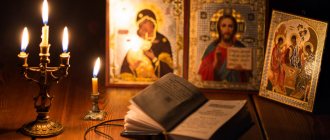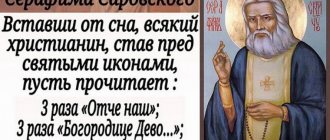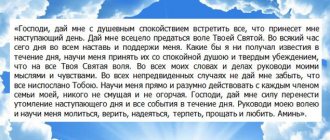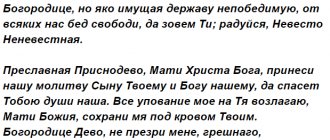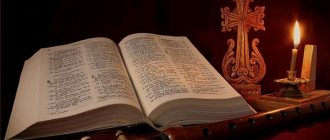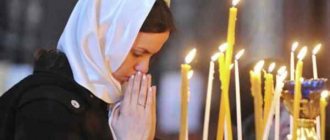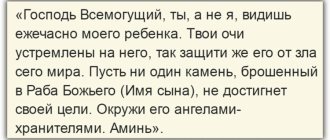The Holy Scripture speaks of two types of prayers: private and public.
In the Orthodox Church, from the first day, there are two types of prayer: public and private, and both have a basis in the Gospel.
Cell book of Archimandrite John Krestyankin. This is one of the revered elders of the Russian Orthodox Church at the end of the 20th - beginning of the 21st centuries
Cell prayer has much more permissions than public prayer. What is not done on some days in church, for example, bows or funeral prayers, is quite acceptable at home - according to desire and mood.
| Cell room | Public | |
| Where do they pray | At home | In the church |
| What the Gospel Says | “But you, when you pray, go into your room and, having shut your door, pray to your Father who is in secret; and your Father, who sees in secret, will reward you openly” (Matthew 18:19 – 20) | “Truly I also say to you that if two of you agree on earth about anything they ask, it will be done for them by My Father in heaven. For where two or three are gathered in My name, there am I in the midst of them” (Matthew 6:6) |
| Prayers that are recited | “To the Heavenly King”, Trisagion, “Our Father”, “Virgin Mother of God”, “Rising from sleep”, “Have mercy on me, O God” | “Angel of Christ,” from “The Chosen Voivode” to “It is Worthy to Eat” |
| What language do they pray in? | In native (translation from Church Slavonic) | In Church Slavonic |
Cell prayer - to pray at home, public prayer - at worship services
Initially, cell prayer was read alone in the cells of monks on days without services. For this purpose, prayer rules were created, including the texts of the same prayers that were read in the temple, but with a slight addition of other prayers.
As applied to the laity, cell prayer is a prayer rule according to which believers pray at home.
Cell and public prayers do not contradict each other, but complement each other. When a person wants to pray alone, he prays privately.
But only in the church is the Divine Liturgy performed, prayer is offered by the priest appointed to perform the sacred rite. Therefore, both prayers are necessarily present in the life of a Christian.
Morning and Evening Rules have been written for cell prayers. For the morning rule, there is a collection of prayers called morning prayers.
Morning prayers:
- "King of Heaven."
- Trisagion.
- "Our Father".
- "Virgin Mother of God"
- "Rising from sleep."
- "Have mercy on me, O God."
- "I believe."
- “God, cleanse.”
- "To You, Master."
- "Saint Angele"
- "Holy Lady"
- Invocation of the saints, prayer for the living and the dead.
For evening prayer (before going to bed) - a collection of prayers called prayers for bedtime.
Evening prayers:
- "King of Heaven."
- Trisagion.
- "Our Father".
- "Have mercy on us, Lord."
- "Eternal God."
- "The Good of the King."
- "Angel of Christ."
- From “The Chosen Voivode” to “It is Worthy to Eat.”
A collection of prayers is also written, which is called the rule for holy communion and is read by those preparing for communion.
Each believer is assigned a cell rule, consisting of such a number of prayers, bows and psalms, which is determined in accordance with the strength of the soul and body of the person praying. This rule should not exceed the strength of the ascetic, so that he does not completely abandon cell prayer.
After all, for some, 20 bows is too much, while others can do 200. There are bows to the ground and bows from the waist. Bows are required before reading prayers.
See also the article Is it possible to pray for those who commit suicide?
About bows
Bows are divided into ground and waist bows; They usually rely on the evening rule, before repose to sleep. It is best to bow before reading the evening prayers, that is, to begin the rule with bows. From bowing, the body will become somewhat tired and warm, and the heart will come into a state of contrition: from such a state, the ascetic will pray more fervently, warmly, and more attentively. You will feel a completely different taste in prayers when they are read after bowing. Bows must be made very slowly, animated by this bodily feat in the cry of the heart and the prayerful cry of the mind. If you want to begin kneeling, give your body the most reverent position that a servant and creation of God should have in the presence of the Lord his God. Then collect your thoughts from wandering everywhere and with extreme leisurely, aloud only to yourself, enclosing your mind in words, say from a contrite and humble heart a prayer: Lord Jesus Christ, Son of God, have mercy on me, a sinner. Having said your prayer, slowly bow to the ground, with reverence and fear of God, without heat, with the feeling of a sinner repenting and begging for forgiveness, as if at the feet of the Lord Jesus Christ Himself. Do not imagine in your mind the image or image of the Lord, but have conviction in his presence; have the conviction that He is looking at you, at your mind and heart, and that His reward is in His hand: the first is an impermissible dream leading to disastrous self-delusion, and conviction in the presence of the omnipresent God is conviction in the all-holy truth127. Having bowed to the ground, again bring your body into reverence and calmness, and again slowly say the above prayer; Having said it, bow again in the above manner. Do not worry about the number of bows: pay all attention to the quality of the prayer performed with kneeling. Not to mention the effect on the spirit, a small number of bows performed in the above manner will have a much stronger effect on the body itself than a large number performed hastily, without attention, for the sake of counting. Experience will not be slow to prove this. Having tired yourself from kneeling, move on to bowing from the waist. The measure of the bow is determined by when, during execution, his lowered hand touches the ground or floor. Having made it an indispensable duty when performing prostrations to perform abundant spiritual activity, consisting of attentiveness, slowness, reverence, and the intention to bring repentance to God, the ascetic will see within a short time how many prostrations his physique can bear. Having excluded from this number a few bows in the form of his weakness and self-indulgence, from the rest of the number of bows he can establish a daily rule for himself and, having asked for the blessing of his confessor or abbot, or one of the monks to whom he has power of attorney and with whom he consults, he can perform This is the rule every day. For the edification of our beloved brothers, let us not keep silent about the following: bows performed for the sake of numbers, inanimate by correct mental and heartfelt deeds, are more harmful than beneficial. The ascetic, having fulfilled them, begins to rejoice. Bot, he says to himself, like the Pharisee mentioned in the Gospel, today God has vouchsafed to make (approximately) three hundred bows! God bless! Is it easy? In modern times, three hundred bows! Who now bears such a rule? And so on. It must be remembered that bowing warms the blood, and warmed blood greatly contributes to the stimulation of mental activity; Having come to such a disposition, the poor ascetic, for the sole reason that he has no concept of true spiritual activity, indulges in soul-harmful mental activity, indulges in vain thoughts and dreams based on his feat, through which he thinks to succeed. The ascetic delights in these thoughts and dreams, cannot get enough of them, internalizes them, implants in himself the destructive passion of conceit. Conceit soon begins to manifest itself in secret condemnation of others and in a clear disposition to lecture them. Obviously, such an attitude is a sign of pride and self-delusion: if the monk had not considered himself superior to his neighbor, he would not have dared to teach him. This is the fruit of any bodily feat, if it is not animated by the intention of repentance and does not have the goal of repentance alone, if the feat in itself is given a Price. True monastic success lies in the fact that the monk sees himself as the most sinful of all people. “The brother said to the Monk Sisoes the Great: “I see that my thought is constantly with God.” The monk answered: “It is not great that your thought is constantly with God; It is great when a monk sees himself under every creature.”128 This was the way of thinking of true servants of God, true monks: it was formed in them from correct spiritual activity. With correct spiritual activity, physical feat is of great importance, being an expression of repentance and humility through the actions of the body. Having seen my humility and my labor, and forsaken all my sins (Ps. 24:18), Saint David prayerfully cries out to God, who in his pious deed combined physical labor with deep repentance and deep humility.
Only in cell prayers does the church allow prayer for suicides
Text of Lev Optinsky's prayer for those who committed suicide
As a rule, in home prayers people ask God for health, well-being, and forgiveness of their sins.
But for a long time, church canons prohibited praying for the repose of the souls of suicides; they were not given funeral services and were buried outside cemeteries.
1925
this year prayers were written for suicides
Considering that after the refusal to perform funeral services for such people, their believing relatives moved away from the church, the clergy went to meet them halfway.
Around 1925 Elder Leo Optina first wrote prayers for suicides, with the aim of consoling the souls of the sinner and his loved ones.
This cell prayer is said at home in the circle of loved ones. Reading prayers console the souls of sinners and their loved ones, because... it is believed that the relatives present take on part of the sin and share the suffering of the martyr’s soul.
Icon of the Intercession of the Blessed Virgin Mary
A component of cell prayers is the reading of akathists, often in honor of the Mother of God. Prayer before any icon of the Mother of God helps those asking and praying with their requests.
The Burning Bush icon will protect from fire
Burning Bush Fire protection
For example, turning to the icon of the Mother of God “The Burning Bush” will protect against fire. Akathist in honor of the Kazan Icon of the Mother of God will help in healing illnesses and patronizes Christian marriage.
Pray for other people - participate in their destiny
An integral part of prayer is prayer for other people. Some doubt whether it is worth praying for their loved ones, acquaintances and strangers, or those who ask us. Silouan of Athos said this:
“Praying for others means shedding blood.”
And Anthony of Sourozh adds:
“And this shedding goes until all vital forces in love and compassion are exhausted.
But to pray for others also means to follow the path of Christ, to become an expression of His intercession, to unite with Him in His prayer and His Incarnation; this means living with the inexpressible groanings of the Spirit in our hearts.
And the more alive our human love, the more deeply we identify through compassion with those for whom we pray, the more perfect is our communication with the Most Merciful Lord...”
Anthony of Sourozh
bishop
Praying for people means taking an active part in their fate, sharing not only their joys, but also their problems, pain and tears. Praying for loved ones is a manifestation of Christian love.
Prayers for home prayer
About suicides:
Seek, Lord, the lost soul (name), if possible, have mercy. Your destinies are unsearchable. Do not make this my prayer a sin. Thy holy will be done. Amen.
Morning and evening prayers "Our Father":
Our Father, who art in heaven! Hallowed be Thy name, Thy kingdom come, Thy will be done, as it is in heaven and on earth. Give us this day our daily bread; and forgive us our debts, just as we forgive our debtors; and do not lead us into temptation, but deliver us from the evil one. For Yours is the kingdom and the power and the glory forever. Amen.
“God cleanse” (first prayer, St. Macarius (from the morning rule)):
God, cleanse me, a sinner, for I have done nothing good before You; but deliver me from the evil one, and Thy will be done in me, that I may open my unworthy lips without condemnation and praise Thy holy name, the Father, and the Son, and the Holy Spirit, now and ever, and unto the ages of ages. Amen.
Evening prayer to the holy Guardian Angel:
Angel of Christ, my holy guardian and protector of my soul and body, forgive me all who have sinned this day, and deliver me from every wickedness of the enemy who opposes me, so that in no sin I will anger my God; but pray for me, a sinful and unworthy servant, that you may show me worthy of the goodness and mercy of the All-Holy Trinity and the Mother of my Lord Jesus Christ and all the saints. Amen.
By leaving a comment, you accept the user agreement
Source of virtues. On cell and church prayer
Source of virtues. |
The publishing house of the Sretensky Monastery published the book of St. Ignatius (Brianchaninov) “The Source of Virtues.
On cell and church prayer." It includes the most significant articles of the saint on cell (home) and church prayer, collected from volumes 1, 2, 3, 4 and 5 of his works. The excerpts offered to the reader indicate ways to acquire living, warm, attentive, grace-filled prayer. “Learn to pray to God correctly,” writes the saint. “Having learned to pray correctly, pray constantly, and you will comfortably inherit salvation.” Why is prayer called the source of virtues? “God is the only source of all true blessings. Prayer is the mother of all virtues, as a means and state of communication between a person and God. She borrows virtues from the source of blessings - God - and assimilates them to the person who through prayer tries to remain in communion with God,” writes Saint Ignatius (Brianchaninov).
The book provides answers to the most frequently asked questions about prayer: why doesn’t God answer prayers, why doesn’t He give what we ask for? How to stay focused during prayer? How can fasting help prayer work? How much should you pray? What to do if prayer comes with great difficulty? Why is a prayer rule necessary, is it necessary to follow it? How to learn unceasing prayer?
Here you can also find information about church prayer - about what services there are, in what frame of mind one should come to church to pray together.
The book “The Source of Virtues. About cell and church prayer" will be of interest to all Orthodox Christians: both those who are just coming to faith - the book has a chapter on the prayer of beginners, and those who have been in the Church for a long time, as well as monastics - the book has chapters dedicated to monastic prayer.
For some, this publication may be the first step towards becoming acquainted with the spiritual heritage of the great ascetic of the Russian Church - St. Ignatius (Brianchaninov).
About prayer.
Article I Blessed is the soul who continually knocks on the door of God's mercy with prayer and with complaints against his rival
(Luke 18:3) - the sin that rapes her - constantly tires the Tireless One: she will rejoice in due time over her purity and her impassivity.
Sometimes our request is immediately heard; sometimes, according to the Savior, God is long-suffering for us (Luke 18:7), that is, He does not quickly fulfill what we ask: He sees that this fulfillment needs to be stopped for a while for our humility, that we need to get tired, to see our weakness, which always reveals itself very sharply when we are left to ourselves.
Prayer, as a conversation with God, is in itself a high good, often much greater than what a person asks for, and the Merciful God, not fulfilling the request, leaves the petitioner in his prayer, so that he does not lose it, does not abandon this highest good when will receive the requested benefit, much less.
God does not satisfy requests the fulfillment of which is associated with harmful consequences; He does not satisfy those requests that are contrary to His holy will, contrary to His wise, incomprehensible destinies.
Contrary to the decree of God, the great Moses, the Seer of God, asked that he be granted entry into the Promised Land, and was not heard (Deut. 3:26); Saint David prayed, strengthening his prayer with fasting, ashes and tears, for the preservation of the life of his sick son, but was not heard (2 Sam. 12). And you, when your request is not fulfilled by God, reverently submit to the will of the All-Holy God, Who, for unknown reasons, left your request unfulfilled.
The holy Apostle James proclaims to the sons of the world, who ask God for earthly blessings to satisfy their carnal lusts: Ask and do not receive, ask evilly, so that you may depend on your desires (James 4:3).
When we want to appear before the king of the earth, we prepare for this with special care: we study what the mood of our heartfelt feelings should be when talking with him, so that, on the impulse of some feeling, we do not get carried away into a word or movement that is unpleasant to the king; We figure out in advance what to say to him, so that we can say whatever pleases us and thereby win him over; We take care that our very outward appearance attracts his attention to us. Moreover, we must make decent preparations when we wish to appear before the King of kings and enter into conversation with Him through prayer.
Man sees on the face, but God sees on the heart (1 Samuel 16:7); but in a person the location of the heart is most consistent with the position of his face, his appearance. And therefore, when praying, give the most reverent position to the body. Stand like a condemned man, with your head bowed, not daring to look up at the sky, with your hands hanging down or folded behind you, as if tied with ropes, as criminals caught at the scene of a crime are usually tied up. Let the sound of your voice be the pitiful sound of crying, the groan of one wounded by a deadly weapon or tormented by a cruel disease.
God looks at the heart. He sees our most intimate, most subtle thoughts and sensations; sees all our past and all our future. God is omnipresent. And therefore stand in your prayer as if you were standing before God Himself. As if you are standing before Him! you stand before your Judge and sovereign Master, on Whom your fate in time and in eternity depends. Use your presence before Him to build your well-being; Do not allow this coming, due to its unworthiness, to serve as the cause of temporary and eternal executions for you.
Intending to offer prayer to God, reject all earthly thoughts and concerns. Do not engage in thoughts that then come to you, no matter how important, brilliant, necessary they may seem. Give what is God to God, and you will have time to give what you need for temporary life in due time. It is impossible at the same time to work for God in prayer and occupy the mind with thoughts and concerns of extraneous things.
Before prayer, show in your heart the incense of the fear of God and holy reverence: think that you have angered God with countless sins, which are more obvious to Him than to your conscience itself: try to appease the Judge with humility. Beware! do not arouse His indignation by negligence and insolence: He is pleased that even those closest to Him, the purest angelic Powers, stand before Him with all reverence and the most holy fear (Ps. 89:8).
The robe of your soul should shine with the whiteness of simplicity.
Nothing should be complicated here! Evil thoughts and feelings of vanity, hypocrisy, pretense, man-pleasing, arrogance, voluptuousness should not be mixed in - these dark and fetid stains with which the spiritual clothing of praying Pharisees can be spotted. Instead of pearls and diamonds, instead of gold and silver, adorn yourself with chastity, humility, tears of meekness and spiritual intelligence, and before you receive these tears, with tears of repentance; Adorn yourself with infantile, angelic gentleness: here are precious utensils! When the King of Kings sees these utensils on the soul, His merciful gaze inclines towards the soul.
Forgiveness of everyone, all offenses without exception, even the most severe ones, is an indispensable condition for success in prayer. Whenever you stand praying
, the Savior commands,
forgive if you have anything against anyone, so that your Father who is in heaven will forgive you your sins: if you do not forgive, neither will your Father who is in heaven forgive you your sins
(Mk. 11:25–26). “The prayers of those who are wicked in memory are sowing on stone,” said the Monk Isaac of Syria.
Moderate, prudent, constant abstinence from food and drink makes the body light, cleanses the mind, gives it vigor, and therefore also serves as preparation for prayer. Incontinence of the belly makes the body heavy, plump, hardens the heart, darkens the mind with a multitude of fumes and gases ascending from the stomach to the brain. As soon as a satiated or satiated person gets up to pray, drowsiness and laziness attack him, many crude dreams are depicted in his imagination, his heart is unable to come to tenderness. Just as intemperance is harmful, so is immoderate fasting, or even more harmful. Weakness of the body, resulting from malnutrition, does not allow prayers to be performed in the proper quantity and with the proper strength.
Contents
To the reader
About prayer. Article I On prayer. Article II The rite of attention to oneself for those living in the middle of the world The praying mind seeks connection with the heart The spirit of prayer of the novice A word about the cell prayer rule A word about church prayer A word about oral and vocal prayer A word about teaching, or the memory of God Advice regarding spiritual monastic work ▪ About prayer ▪ About preparing for prayer ▪ About attention during prayer ▪ About the cell rule ▪ About thinking about God Explanation of the Lord's Prayer “Our Father.” Word for Tuesday of the 23rd week On prayer and repentance. Second lesson on the Sunday of the Publican and the Pharisee. Explanation of the mysterious meaning of the Gospel story. Lesson for the 31st week: About prayer. Sermon on Saturday of the 32nd week
BUY A BOOK
The book can be purchased:
- in the wholesale sales department of the Sretensky Monastery - Moscow, st. Samokatnaya, 3/8, building 15, tel.: +7 (495) 628‒82‒10, +7 (495) 621‒86‒40,
- in the store of the Sretensky Monastery - Moscow, st. Bolshaya Lubyanka, 17, tel.: +7 (495) 150‒19‒09,
- in the Sretenie online store with delivery throughout Russia and the EAEU countries.
